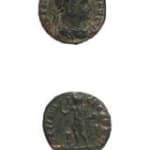Bronze Coin of Emperor Constantine I the Great, 307 CE - 337 CE
Bronze
C.4508
Further images
Obverse: IMP CONSTANTINVS PF AVG; Laureate, Draped, and Cuirassed Bust of the Emperor Facing Righ Reverse: SOLI INVICTO COMITI; The Sun God Sol Standing to the Left, Holding a Glob...
Obverse: IMP CONSTANTINVS PF AVG; Laureate, Draped, and Cuirassed Bust of the Emperor Facing Righ
Reverse: SOLI INVICTO COMITI; The Sun God Sol Standing to the Left, Holding a Glob
Constantine I, called Constantine the Great, was the first Roman ruler to be converted to Christianity. He was the founder of Constantinople (present-day Istanbul), which remained the capital of the Eastern Roman (Byzantine) Empire until 1453. Constantine the Great unified a tottering empire, reorganized the Roman state, and set the stage for the final victory of Christianity at the end of the 4th century. Many modern scholars accept the sincerity of his religious conviction. His conversion was a gradual process; at first he probably associated Christ with the victorious sun god. By the time of the Council of Nicaea (325), however, he was completely Christian, but still tolerated paganism among his subjects. Although criticized by his enemies as a proponent of a crude and false religion, Constantine the Great strengthened the Roman Empire and ensured its survival in the East. As the first emperor to rule in the name of Jesus Christ, he was a major figure in the foundation of medieval Christian Europe.
How many hands have touched a coin in your pocket or purse? What eras and lands have the coin traversed on its journey into our possession? As we reach into our pockets to pull out some change, we rarely hesitate to think of who might have touched the coin before us, or where the coin will venture to after it leaves our hands. More than money, coins are a symbol of the state that struck them, of a specific time and location, whether contemporary currencies or artifacts of a long forgotten empire. This stunning hand-struck coin reveals an expertise of craftsmanship and intricate sculptural detail that is often lacking in contemporary machine-made currencies. This ancient coin is a memorial to the Emperor Constantius the Great, passed from the hands of civilization to civilization, from generation to generation that still appears as vibrant today as the day it was struck.
Reverse: SOLI INVICTO COMITI; The Sun God Sol Standing to the Left, Holding a Glob
Constantine I, called Constantine the Great, was the first Roman ruler to be converted to Christianity. He was the founder of Constantinople (present-day Istanbul), which remained the capital of the Eastern Roman (Byzantine) Empire until 1453. Constantine the Great unified a tottering empire, reorganized the Roman state, and set the stage for the final victory of Christianity at the end of the 4th century. Many modern scholars accept the sincerity of his religious conviction. His conversion was a gradual process; at first he probably associated Christ with the victorious sun god. By the time of the Council of Nicaea (325), however, he was completely Christian, but still tolerated paganism among his subjects. Although criticized by his enemies as a proponent of a crude and false religion, Constantine the Great strengthened the Roman Empire and ensured its survival in the East. As the first emperor to rule in the name of Jesus Christ, he was a major figure in the foundation of medieval Christian Europe.
How many hands have touched a coin in your pocket or purse? What eras and lands have the coin traversed on its journey into our possession? As we reach into our pockets to pull out some change, we rarely hesitate to think of who might have touched the coin before us, or where the coin will venture to after it leaves our hands. More than money, coins are a symbol of the state that struck them, of a specific time and location, whether contemporary currencies or artifacts of a long forgotten empire. This stunning hand-struck coin reveals an expertise of craftsmanship and intricate sculptural detail that is often lacking in contemporary machine-made currencies. This ancient coin is a memorial to the Emperor Constantius the Great, passed from the hands of civilization to civilization, from generation to generation that still appears as vibrant today as the day it was struck.





